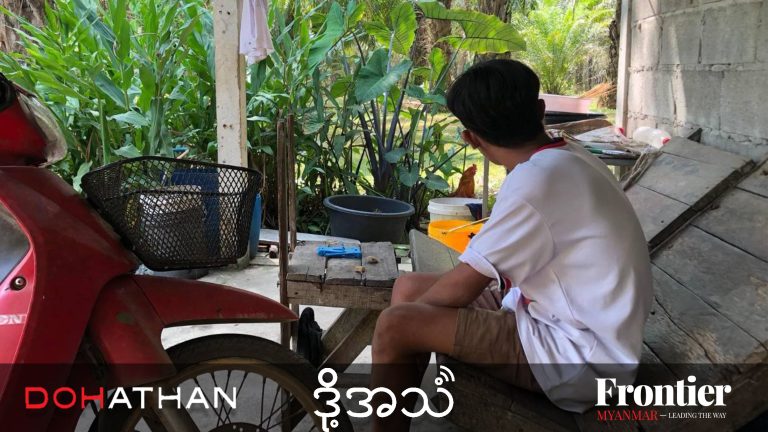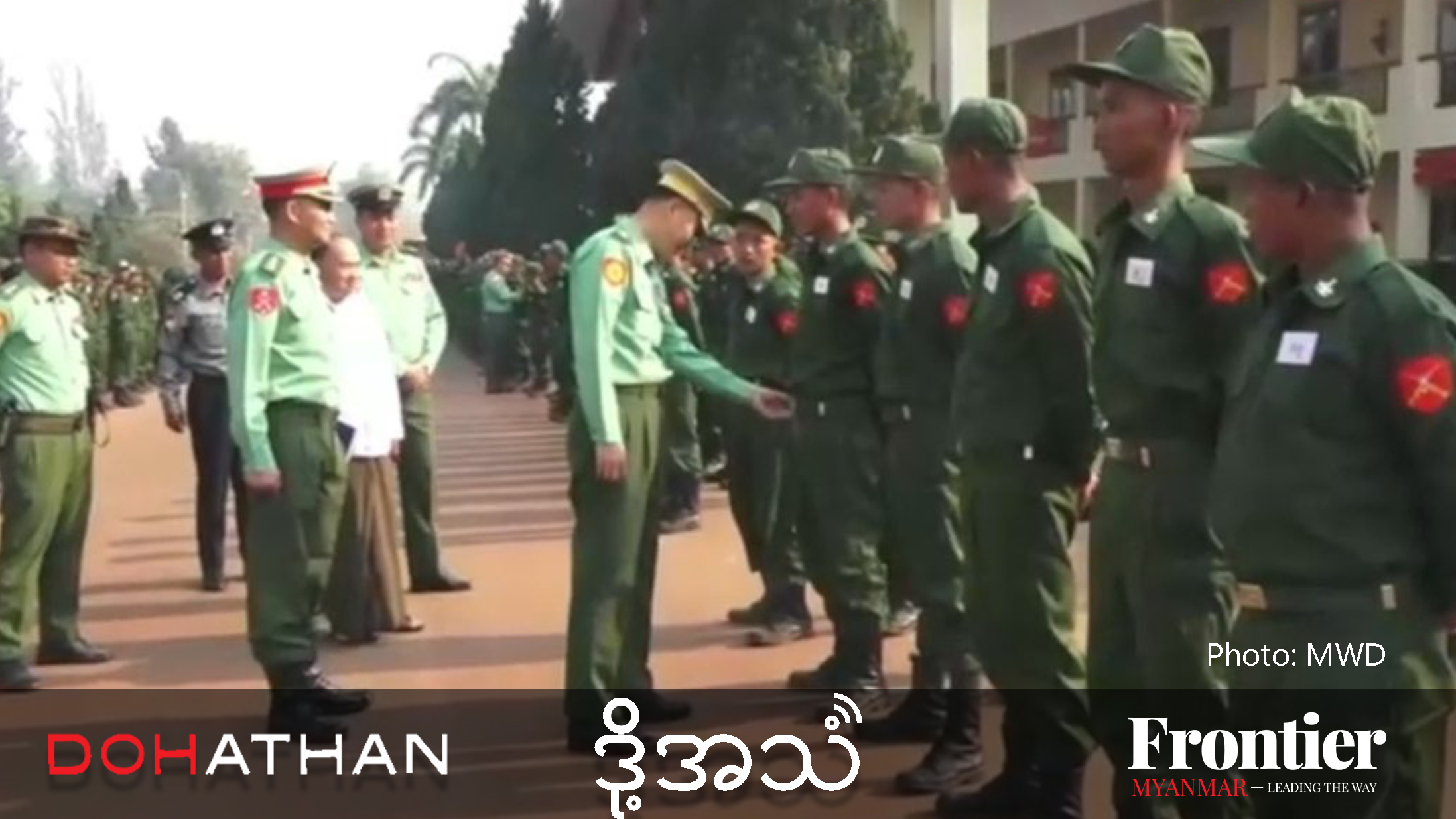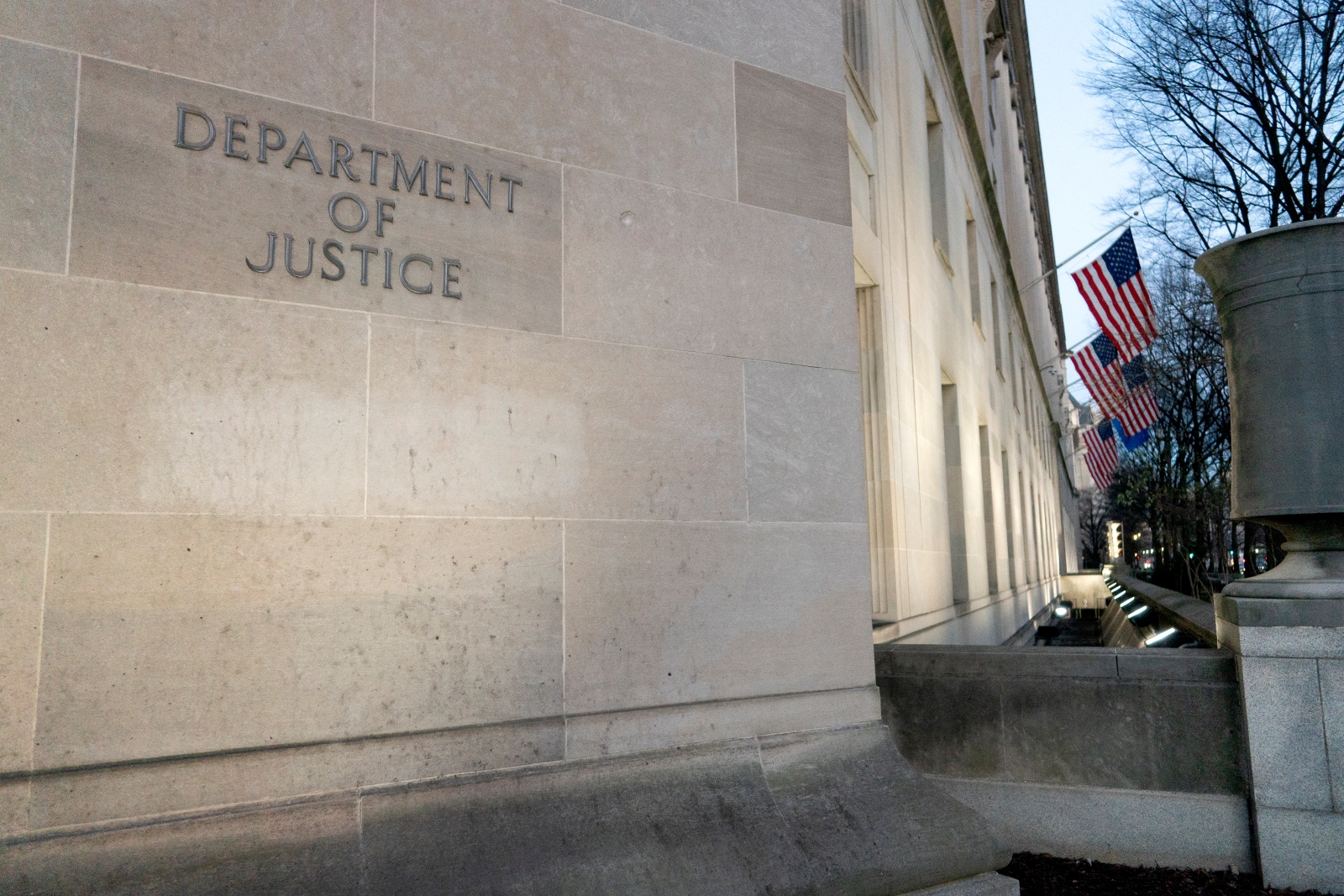The Restoration Council of Shan State has ramped up forced conscription in its headquarters region, but the troop build-up seems more aimed at other ethnic armed groups than the Myanmar military.
By NAW BETTY HAN | FRONTIER
The first hour of driving was smooth, but the paved road soon devolved into a rough dirt track. I was jolted with each bump, feeling like a lead ball being shaken around in an aluminum can.
“This road was built by the RCSS on its own,” our driver, a woman who lives in the Restoration Council of Shan State headquarters Loi Tai Leng, said apologetically. “In the past, there were no roads, and we had to walk through the forest for about two days.”
Rather than two days, it took us about two hours to reach the first Thai military checkpoint, with a second about an hour and a half after that.
“We are now entering Shan State,” our driver announced proudly.
Indeed, the next checkpoint we saw was manned by a soldier in a different uniform, with RCSS clearly emblazoned on the building.
The RCSS headquarters were established in this mountainous part of Mong Hset Township, in southern Shan, in 1996, when the RCSS was formed from the remnants of earlier Shan armed movements.
The group has fought for political autonomy for the Shan people for decades, but has long been dogged by accusations of drug trafficking. More recently, the RCSS has drawn controversy for primarily fighting with other ethnic armed groups, rather than the Myanmar military.
“The Loi Tai Leng area is very beautiful and the people seem very peaceful,” I said, to which the driver gave a knowing smile.
“If you get up early in the morning, you will see a different view of the same landscape,” she said, without elaborating.
A village of soldiers
Because of that cryptic comment, this Frontier reporter woke up early the next morning to see what I might find. Just like the previous evening, the view of the small village perched in the mountains was beautiful, even more so as the sun started to rise in the morning fog. But while captivated by this scenery, I saw the villagers of Loi Tai Leng beginning to stir.
I was staying at a building near the village’s entrance, giving me a good view of everybody coming in and out. As they got closer, I saw that villagers who once looked like ordinary farmers were all dressed in military uniforms. Wooden guns were slung over the motorbikes, some of them carrying entire families, and even some women held the training guns with a casual familiarity.

I had so many questions in my head when I turned to a nearby villager, a farmer in his 60s who declined to give his name, but did share some information.
“Why do they take those wooden guns?” I asked first. “Are they RCSS soldiers? Where are they going?”
He answered all of my questions in one sentence: “They are those who will soon become RCSS soldiers.”
These villagers had been conscripted by the RCSS after it announced in February that all men and women living in its territory must serve the group for six years, regardless of ethnicity.
After training, those who have completed university can do office work, while engineers and technicians will be reserved for equipment and vehicle maintenance or IT work. The policy appears to be launching in the Loi Tai Leng area first, but even those who have gone abroad were ordered to register with the RCSS and be prepared to return to Shan to perform their duties.
“Everyone who is listed and called by the RCSS administrators must go to the military training ground,” said the resident, whose 24-year-old daughter and 28-year-old son-in-law were both drafted.
“With no one at home to take care of their child, they even took the five-year-old with them to military training,” he explained. “Other villagers are in the same situation as my daughter’s family. Children are playing nearby while their fathers and mothers are doing military drills.”
Everyone who is called up under the military service law has to attend basic training for three months, where they undergo martial arts, marksmanship and endurance training. Frontier was barred from viewing these training exercises.
After completing their training, new recruits are divided according to their skills and distributed to areas where they’re needed. After another three months’ apprenticeship on assignment, they pass probation and become full serving members of the RCSS.
The farmer explained that there were about 500 houses in this village, with a cluster of another five similarly sized villages in the Loi Tai Leng area, where recruitment is already underway.
“I don’t know exactly the number of houses and population of all these villages. After this law was promulgated, one or two people per household had to serve in the military. It’s not easy for people in this area to flee somewhere else, so they have to do military service,” he said.
When asked how he felt about the situation, he answered my question with one of his own.
“Who would want their child to be a soldier?”
Troops build up
With the country facing a widespread civil war, Myanmar has caught conscription fever, particularly in Shan. The military, RCSS, Myanmar National Democratic Alliance Army and Ta’ang National Liberation Army have all recently announced or expanded forced recruitment policies.
But what makes the RCSS stand out is its immediate and unconditional plan to conscript women and people of any ethnicity.
The Myanmar military makes no distinction when it comes to ethnicity, but has exempted women – for now. The TNLA, meanwhile, only conscripts Ta’ang people, and only takes women if they have three or more siblings. The MNDAA conscripts people from any ethnicity native to northern Shan, but also does not appear to draft women.
Nang Khin Kyi, a 28-year-old from Langkho Township, moved to Loi Tai Leng in 2016 after marrying a man from the area.
“I don’t know how the list was compiled and how people were selected. In my house, I am the only person on the list, and in some houses, the man is on the list and the woman is not on the list,” she said. “I can’t say whether those who haven’t been called yet might be called later.”

She said there are around 2,000 new recruits in her training batch, including 500 women. Khin Kyi said many of the women, including her, are college graduates who hope to become office workers after they complete their training, as promised in the official RCSS policy.
Despite this troop build-up, the RCSS has continued to respect the Nationwide Ceasefire Agreement, signed with the government in 2015. It has avoided clashes with the regime since the 2021 military coup plunged the country into a political crisis, even as other major NCA signatories have returned to war, declaring the treaty null and void.
But that doesn’t mean the RCSS has been at peace. In 2021, it suffered a heavy defeat at the hands of the TNLA and rival Shan group the Shan State Progress Party. The TNLA and SSPP allied to eject the RCSS from northern Shan, pushing it back to its traditional strongholds in the south. The landscape dramatically changed again last year, when the TNLA and MNDAA launched a major joint offensive against the Myanmar military in October. They both seized huge swathes of northern Shan, which may have threatened the TNLA’s former ally the SSPP.
Since then, the SSPP and RCSS agreed to a truce, and even announced a plan to eventually unite as one armed group. Sources in Loi Tai Leng hinted that the new conscription policy may have been launched with more of an eye on the TNLA than the military regime.
“Conscription has always been a policy in the RCSS. There are some people who are called up for military service, but not every house. Now, under the new policy that everyone who reaches the age of adulthood must serve in the military, it seems like they are recruiting a much larger number of people,” said Khin Kyi. “We know that we are preparing to retake areas that were lost after the war with the TNLA. That’s why I don’t want to go to the frontlines, I just want to do office work.”
RCSS spokesperson Major Sai Kham Seng said this announcement was just a reminder of a law already in place, in response to the military’s new conscription enforcement.
“It was a declaration of an already existing military service law,” he said, refusing to answer questions about why the RCSS was recruiting so many more troops than before.
“If you are from the Shan ethnic group, you have to serve in the Shan army,” he said. “It’s a historical duty. Those who refuse to serve, their houses and vehicles will be confiscated according to the RCSS property law.”
He said the RCSS is not the only ethnic armed group turning to conscription, and said human resources are not just needed for fighting, but for building a civilian administration as well.
“We need to create a state of self-governance to retake the territories that were lost,” he added, declining to explain which lost territories he had in mind.
For many young Shan people, who support the RCSS but don’t want to fight, the new rival conscription policies feel like walls closing in from all sides.
“We’re now living in fear of whether we will be recruited by the military regime, the RCSS or some other ethnic armed group,” said Sai Zaw Oo, a Shan man from Langkho who said he previously supported the RCSS but is upset about the conscription policy.
“I can’t understand why the RCSS, instead of fighting the military regime, is putting pressure on Shan people in the same way as the military regime,” he said.
Those who go to the training ground return around 6pm, riding their motorbikes back the same way they came. When the sun sets in the evening, the village is once again alive with locals, just as it was when I first arrived, with no military uniforms to be seen.







